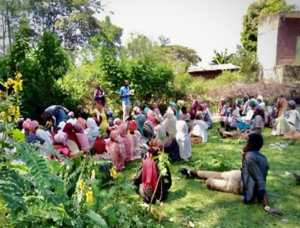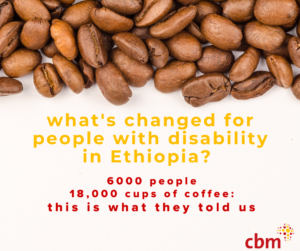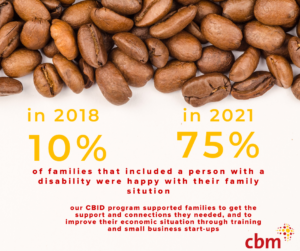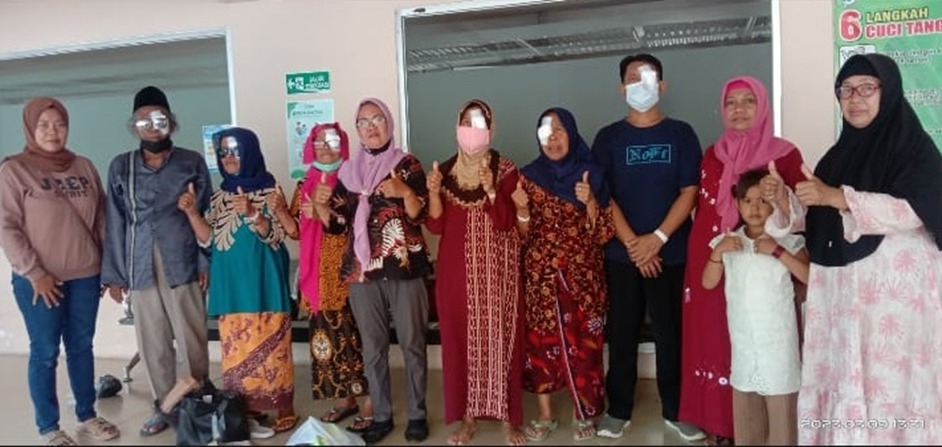Coffee kicks off big inclusion shift in Ethiopia
Stories | January 22, 2024 | Author: Anthony Marcus
Coffee, it is said, was first discovered in medieval Ethiopia. Now the whole world is coffee-crazy. But, for Ethiopians, coffee remains more than a morning wake-up; it sits at the centre of a core cultural tradition called jebena buna, or “the coffee ceremony”.
The ceremony not only defines what it means to belong, but it is where neighbours share news, gossip and opinions about the day’s issues.
When CBM Australia came to Ethiopia to help its local partners break the cycle of disability and poverty and support inclusion, they understood the coffee ceremony would be important in fostering the relationships necessary to get the community on board.
The coffee ceremony typically begins with lighting a burner with frankincense or sandalwood and spreading fresh grasses and flowers on the floor and table. The beans are then washed, roasted, and ground. When the coffee is brewed, it is then poured into little handleless cups.

To create the cultural context for dialogue and change, CBM’s partner hosted almost 6,000 people drinking almost 18,000 cups of coffee at disability and inclusion coffee ceremonies in a district in rural Ethiopia between 2018 and 2021.

CBM’s partner commenced their work to confront stigma and stereotypes against people with disability in 2018. It encompassed enhancing local skills for creating better accessibility, sustainable livelihood activities, and new organisations to advocate for the needs and rights of people with disabilities.
Before starting the programs, they interviewed a sample of 320 families to help understand their situation and assess change over time. Seventy-five per cent said they were unhappy with their family situation, and almost 75% believed they were among the poorest families in their community. And by the time the program finished in 2021, only 10% were still unhappy with their family situation.

The number who believed they were poorer than their neighbours had dropped to about 30%. More remarkably, during these same difficult pandemic years, the percentage of families who said their incomes had gone up in the previous year went from under 10% in 2018 to over 90% by the end of 2021. Meanwhile, the percentage of adult participants with a disability who believed that they could not lead an independent life dropped from 38% to 22%.
Families were not just becoming happier, more confident and economically stable, but the communities around them had also changed since the first coffee ceremony. The number of sampled families that said they felt supported by the community nearly doubled from 39% to 69%, and the percentage that felt discrimination from neighbours dropped spectacularly from 67% to 15%.
While there is still much work to be done to break the cycle of poverty and disability in poor rural communities across Ethiopia, the fieldworkers and community-based inclusive development committees (CBID) successfully used the coffee ceremony to take the first vital steps towards creating happier and more inclusive communities.
Our team involved the community, local government, religious leaders, and other development agencies in their vision of development and change.
CBM acknowledges the support of the Australian Government through the Australian NGO Cooperation Program (ANCP).
https://www.cbm.org.au/stories/coffee-kicks-off-big-inclusion-shift-in-ethiopia
Related Stories

Disability rights-based approach to the care agenda
The urgent need to build and rethink care and support systems to address the...

Challenging misconceptions: Spreading the good news about cataract surgery
Cataracts are the leading cause of blindness worldwide. Despite...

Walking and writing with ease: Clydelle’s journey
Clydelle is a delightful little five-year-old from the Philippines. Born with Cerebral Palsy, she...
